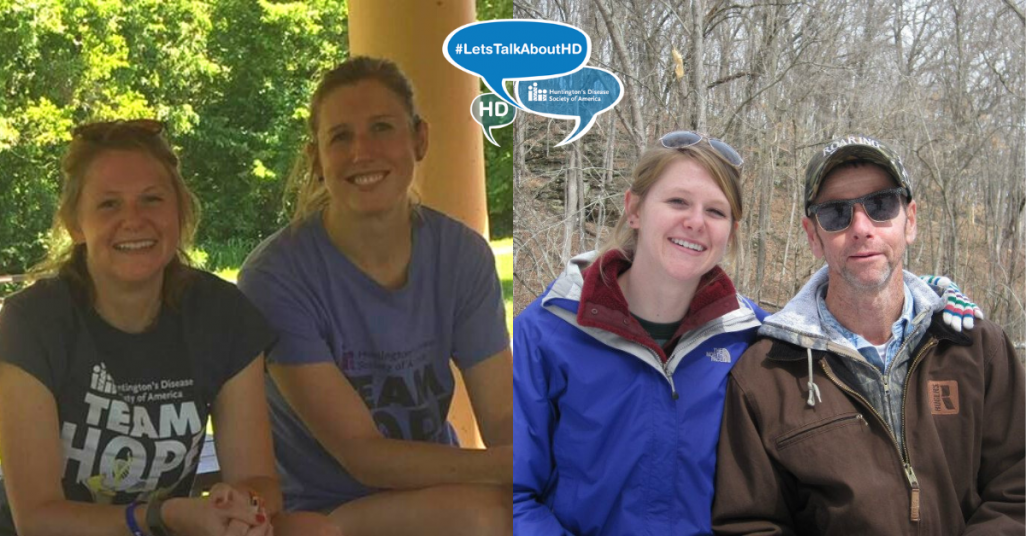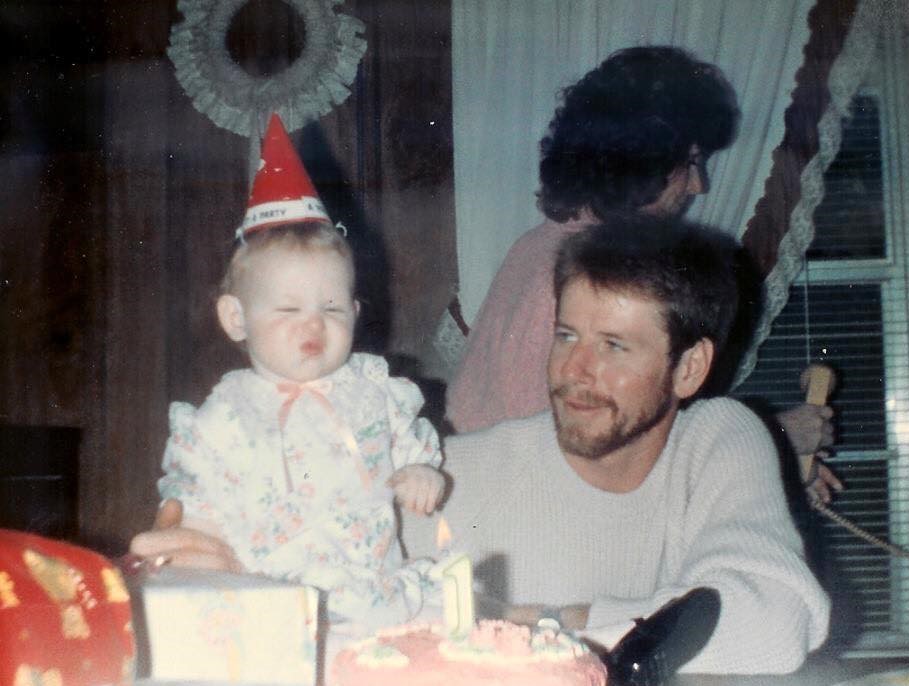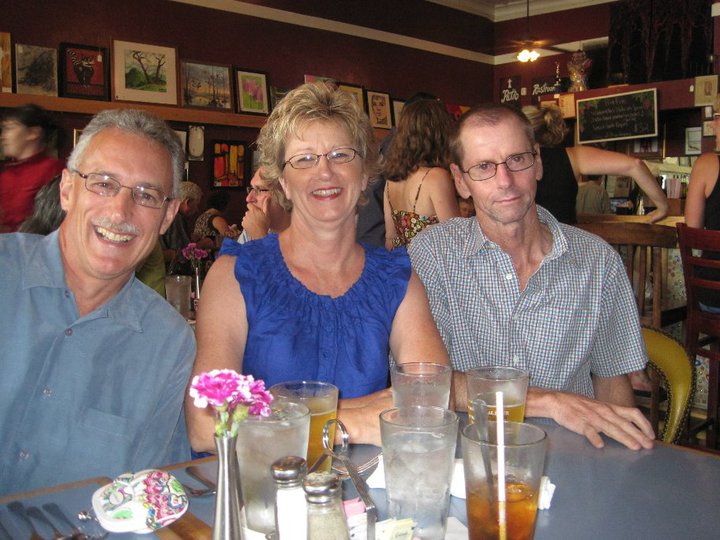
By Matthew Santamaria (msantamaria@hdsa.org)
Missouri resident Candace Rodman grew up in a small town in Arkansas called Brockwell. When she was growing up, she had a large family - her father was the youngest of ten children and they were all close.
“Pretty much the whole family would go to Granny Faye’s almost every weekend and, since I am an only-child, I absolutely loved and appreciated growing up with all my cousins,” said Candace.

Candance has experienced the pain of losing loved ones around her which was due to the cause of complications from Huntington’s disease (HD), a fatal genetic disorder that causes the progressive breakdown of nerve cells in the brain. It deteriorates a person’s physical and mental abilities during their prime working years and has no cure.

“My grandpa Albert was only 57-years-old when he passed, two uncles made it to 53 and 59 years-old, an aunt and uncle that only made it to 34 and 36 years-old,” Candace explains. “To this day we are still close, because when you live in a family with HD, you have to learn to rely on each other for comfort and cherish the days that you have with your loved ones.”
At a young age, Candace started to notice changes in her father. The symptoms of HD are described as having ALS, Parkinson’s and Alzheimer’s – simultaneously. Symptoms include personality changes, mood swings, depression, forgetfulness, impaired judgment, unsteady gait, involuntary movements, slurred speech, difficulty in swallowing, and significant weight loss.
“He would lose his balance, have a hard time connecting his fork to his mouth, slurring his speech or having bouts of temper, I realized that it could be my fate as well,” said Candace. “Seeing my family go through the physical problems associated with HD is hard. Seeing them struggle with the mental problems is even harder. Having them taken from us too soon is the hardest.”
Every child of a parent with HD has a 50/50 chance of inheriting the faulty gene. Candance talked with her father about being tested but he did not want the guilt of knowing that he passed HD to her. Candance’s father later passed away at the age of 53-years-old.
The decision to get genetically tested is difficult to make. Each year, 5-10% are tested. It is never the right or wrong decision to be tested. There are people that see no benefit in knowing that they will develop the disease while others want to know in order to make informed choices about their future. It can take up to several weeks to receive your results from the genetic testing center.
“I understood and respected his response,” Candace explains. “I never once blamed my parents for possibly putting me in this situation, I was born long before anyone really understood the severity of it. However, years later, when I was a young adult and considering my future, marriage, kids, money, education, etc., I wanted to know. I wanted to make the right decisions that didn’t put anyone else at risk and I wanted to prepare myself for the worst-case scenario and set my life up so that no one would have to worry about me. So, I did it and I recommend it to everyone I talk with. I know it’s scary, but the peace of mind is worth it. It’s worth it for you and future generations. Regardless of the outcome, you can prepare yourself and use the resources available to make healthy decisions going forward.”
One aspect of HD that her family has learned is survivor’s guilt. For those that do not have HD, they must witness firsthand the symptoms of HD taking effect on someone.
“Those who don’t have it feel the heavy survivor’s guilt, the wonder of how we can take care of each other, the dread of who will pass next, worry about suicide, go to doctor appointments, learn as much as possible so we can help, and donate as much money and time that can be afforded to further research on finding a cure,” Candace explains. “That is how I became involved with HDSA.”
When Candace moved to Missouri, she found HDSA’s Missouri Chapter and became involved with HDSA’s Team Hope Walk events. Team Hope is HDSA’s largest national grassroots fundraising event. Thousands of families, friends, co-workers, neighbors, and communities walk together each year to support HDSA's fight to improve the lives of people affected by HD and their families. When the volunteer leader stepped down, she stepped in and has been in this role for more than seven years.
“It’s extremely rewarding,” said Candace. “While I was going through grad school, it was hard for me to show my support financially, so it felt great to be able to donate my time to plan the event every year. Not only do we raise generous amounts of money that goes toward research for finding a cure, but I have also met many other HD families through the event that have become my friends and a small community of folks that can empathize with each other’s situations.”
With all the events that Candance attends and the people that she talks to, she has called the HD Community a tough breed.
“We deal with harder things than most people can imagine,” Candace explains. “We are forced to make hard decisions and to say goodbye too soon. I now rely on my friends, and family and even my HD Family to get me through hard times, I do what I can for them as well.”
###
Huntington’s disease (HD) is a fatal genetic disorder that causes the progressive breakdown of nerve cells in the brain. It deteriorates a person’s physical and mental abilities during their prime working years and has no cure. Every child of a parent with HD has a 50/50 chance of inheriting the faulty gene. Today, there are approximately 41,000 symptomatic Americans and more than 200,000 at-risk of inheriting the disease. The symptoms of HD are described as having ALS, Parkinson’s and Alzheimer’s – simultaneously.
The Huntington’s Disease Society of America is the premier nonprofit organization dedicated to improving the lives of everyone affected by HD. From community services and education to advocacy and research, HDSA is the world’s leader in providing help for today and hope for tomorrow for people with HD and their families.
HDSA was founded in 1967 by Marjorie Guthrie, the wife of legendary folk singer Woody Guthrie. Woody died from HD complications when he was only 55 years old, but the Guthrie family legacy lives on at HDSA to this day.
To learn more about Huntington’s disease and the work of the Huntington’s Disease Society of America, visit www.HDSA.org or call 1(800)345-HDSA.
This is a story featuring a personal experience with Huntington’s disease. If you would like to have your story told please contact Matthew Santamaria at msantamaria@hdsa.org
Missouri resident Candace Rodman grew up in a small town in Arkansas called Brockwell. When she was growing up, she had a large family - her father was the youngest of ten children and they were all close.
“Pretty much the whole family would go to Granny Faye’s almost every weekend and, since I am an only-child, I absolutely loved and appreciated growing up with all my cousins,” said Candace.

Candance has experienced the pain of losing loved ones around her which was due to the cause of complications from Huntington’s disease (HD), a fatal genetic disorder that causes the progressive breakdown of nerve cells in the brain. It deteriorates a person’s physical and mental abilities during their prime working years and has no cure.

“My grandpa Albert was only 57-years-old when he passed, two uncles made it to 53 and 59 years-old, an aunt and uncle that only made it to 34 and 36 years-old,” Candace explains. “To this day we are still close, because when you live in a family with HD, you have to learn to rely on each other for comfort and cherish the days that you have with your loved ones.”
At a young age, Candace started to notice changes in her father. The symptoms of HD are described as having ALS, Parkinson’s and Alzheimer’s – simultaneously. Symptoms include personality changes, mood swings, depression, forgetfulness, impaired judgment, unsteady gait, involuntary movements, slurred speech, difficulty in swallowing, and significant weight loss.
“He would lose his balance, have a hard time connecting his fork to his mouth, slurring his speech or having bouts of temper, I realized that it could be my fate as well,” said Candace. “Seeing my family go through the physical problems associated with HD is hard. Seeing them struggle with the mental problems is even harder. Having them taken from us too soon is the hardest.”
Every child of a parent with HD has a 50/50 chance of inheriting the faulty gene. Candance talked with her father about being tested but he did not want the guilt of knowing that he passed HD to her. Candance’s father later passed away at the age of 53-years-old.
The decision to get genetically tested is difficult to make. Each year, 5-10% are tested. It is never the right or wrong decision to be tested. There are people that see no benefit in knowing that they will develop the disease while others want to know in order to make informed choices about their future. It can take up to several weeks to receive your results from the genetic testing center.
“I understood and respected his response,” Candace explains. “I never once blamed my parents for possibly putting me in this situation, I was born long before anyone really understood the severity of it. However, years later, when I was a young adult and considering my future, marriage, kids, money, education, etc., I wanted to know. I wanted to make the right decisions that didn’t put anyone else at risk and I wanted to prepare myself for the worst-case scenario and set my life up so that no one would have to worry about me. So, I did it and I recommend it to everyone I talk with. I know it’s scary, but the peace of mind is worth it. It’s worth it for you and future generations. Regardless of the outcome, you can prepare yourself and use the resources available to make healthy decisions going forward.”
One aspect of HD that her family has learned is survivor’s guilt. For those that do not have HD, they must witness firsthand the symptoms of HD taking effect on someone.
“Those who don’t have it feel the heavy survivor’s guilt, the wonder of how we can take care of each other, the dread of who will pass next, worry about suicide, go to doctor appointments, learn as much as possible so we can help, and donate as much money and time that can be afforded to further research on finding a cure,” Candace explains. “That is how I became involved with HDSA.”
When Candace moved to Missouri, she found HDSA’s Missouri Chapter and became involved with HDSA’s Team Hope Walk events. Team Hope is HDSA’s largest national grassroots fundraising event. Thousands of families, friends, co-workers, neighbors, and communities walk together each year to support HDSA's fight to improve the lives of people affected by HD and their families. When the volunteer leader stepped down, she stepped in and has been in this role for more than seven years.
“It’s extremely rewarding,” said Candace. “While I was going through grad school, it was hard for me to show my support financially, so it felt great to be able to donate my time to plan the event every year. Not only do we raise generous amounts of money that goes toward research for finding a cure, but I have also met many other HD families through the event that have become my friends and a small community of folks that can empathize with each other’s situations.”
With all the events that Candance attends and the people that she talks to, she has called the HD Community a tough breed.
“We deal with harder things than most people can imagine,” Candace explains. “We are forced to make hard decisions and to say goodbye too soon. I now rely on my friends, and family and even my HD Family to get me through hard times, I do what I can for them as well.”
Candace has a message for the HD Community:
“Educate and prepare yourselves. There are resources out there, and you should use them. Lean on your family and find other HD family because you do not have to go through HD alone. I do what I can for the larger HD Community through HDSA.”
“Educate and prepare yourselves. There are resources out there, and you should use them. Lean on your family and find other HD family because you do not have to go through HD alone. I do what I can for the larger HD Community through HDSA.”
###
Huntington’s disease (HD) is a fatal genetic disorder that causes the progressive breakdown of nerve cells in the brain. It deteriorates a person’s physical and mental abilities during their prime working years and has no cure. Every child of a parent with HD has a 50/50 chance of inheriting the faulty gene. Today, there are approximately 41,000 symptomatic Americans and more than 200,000 at-risk of inheriting the disease. The symptoms of HD are described as having ALS, Parkinson’s and Alzheimer’s – simultaneously.
The Huntington’s Disease Society of America is the premier nonprofit organization dedicated to improving the lives of everyone affected by HD. From community services and education to advocacy and research, HDSA is the world’s leader in providing help for today and hope for tomorrow for people with HD and their families.
HDSA was founded in 1967 by Marjorie Guthrie, the wife of legendary folk singer Woody Guthrie. Woody died from HD complications when he was only 55 years old, but the Guthrie family legacy lives on at HDSA to this day.
To learn more about Huntington’s disease and the work of the Huntington’s Disease Society of America, visit www.HDSA.org or call 1(800)345-HDSA.
This is a story featuring a personal experience with Huntington’s disease. If you would like to have your story told please contact Matthew Santamaria at msantamaria@hdsa.org
